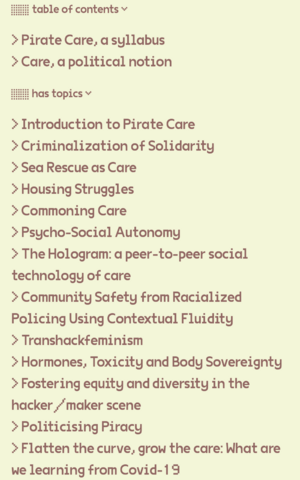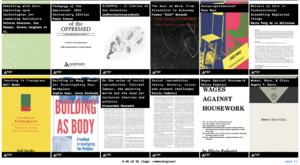The pirates, in all too many cases, are not alienated proles. Nor do they represent some comfortingly distinct outside. They are us. (Adrian Johns 2009)
While the transmediale 2024 festival theme asks “how logics of content production determine and frustrate our relations to technology,” (https://transmediale.de) the research workshop “content/form” calls for an exploration of the limits of political possibilities and collective action, and urges the consideration of alternatives, especially for research practices and their tools themselves (https://aprja.net). In this context, the following text briefly comments on the work syllabus ⦚ Pirate Care (2019-2020), addressing its specific content/form of cultural piracy as usable politics and pedagogies.
Initiated in 2019 by Valeria Graziano, Marcell Mars, and Tomislav Medak, syllabus ⦚ Pirate Care serves as a transnational research project engaging activists, researchers, hackers, and artists concerned with the ‘crisis of care’ and the criminalization of solidarity in ‘neoliberal policies’ (https://pirate.care). It presents civic and artistic projects and activist practices such as “Transhackfeminism,” Soprasotto, a communing and collectivising childcare initiative in Milan, or “Sea Rescue as Care,” to name a few. The syllabus, linked to a literature repository on the shadow library Memory of the Word/Public Library, lives on a publishing platform developed in-house by Marcell Mars. Sandpoints enables collaborative writing, remixing, and maintenance of a catalogue of learning resources. The arrangement of these specific forms of ‘pirate care’ – an open curriculum linked to a shadow library, both built with free software, together with the call for collective action/disobedience – produces and distributes activities and content that can be linked back to the specific form of solidarity and (hacker) ethics that the project is concerned with. Especially regarding the questions of political writing and political publishing syllabus ⦚ Pirate Care situates itself in the political tradition of radical publishing within a new media environment (Dean et al. 2013). Mars and Medak argue that courts, constrained by viewing intellectual property through a copyright lens, have failed to reconcile the conflict between access to knowledge and fair compensation for intellectual labour. Instead, they have overwhelmingly supported the commercial interests of major copyright industries, further deepening social tensions through the commodification of knowledge[1] in the age of digital reproduction (Mars and Medak 2019). The author of Piracy. The Intellectual Property Wars from Gutenberg to Gates, Adrian Johns, writes that information has become a key commodity in the globalised economy and that piracy today goes beyond the theft of intellectual property to affect core aspects of modern culture, science, technology, authorship, policing, politics, and the very foundations of economic and social order. “That is why the topic of piracy causes the anxiety that it so evidently does” (Johns 2009, p. 26). On both ends, for the attacker and the attacked. By distributing information otherwise syllabus ⦚ Pirate Care challenges the ‘unusable politics’ (transmediale 2024) and ‘unjust laws’ (Swartz 2008) that continue to produce harmful environments, offering a reassessment of the inherently violent dynamics of the realities of Publishing (with a capital P) and the circulation of information as a commodity together with its imperialist logics of structural discrimination. The project as a model for commoning knowledge in the form of a technically informed care infrastructure not only enables its users to engage with the syllabus and library as a curriculum but also to build and maintain similar infrastructures. As an otherwise publishing infrastructure, projects like syllabus ⦚ Pirate Care continue to have an impact on politics, pedagogies, and governance and can serve as models worth to carefully ‘institute’.[2].


- ↑ Mars and Medak primarily refer to ‘academic publishing circuits’. See their article System of a Takedown: Control and De-commodification in the Circuits of Academic Publishing, 2019.
- ↑ In their 2022 publication Infrastructural Interactions: Survival, Resistance and Radical Care, The Institute for Technology in the Public Interest explores how big tech continues to intervene in the public realm. Therefore, TITiPI questions: „How can we attend to these shifts collectively in order to demand public data infrastructures that can act in the „public interest? And how can we institute this?“